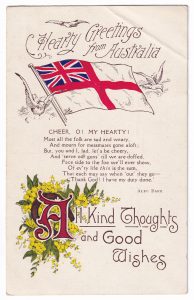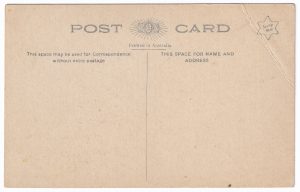[Editor: This postcard (unused), which incorporates a poem, as well as an illustration of a British naval flag (the white ensign), and a wattle design, is estimated to have been published in the early 20th Century. The postcard is undated.]
Hearty Greetings from Australia
[Front of postcard]
Hearty Greetings from Australia
Cheer, O! My hearty!
Most all the folk are sad and weary,
And mourn for messmates gone aloft;
But, you and I, lad, let’s be cheery,
And ‘serve our guns’ till we are doffed.
Face side to the foe we’ll ever show,
Of ev’ry life this is the sum,
That each may say when ‘out’ they go —
‘Thank God! I have my duty done.’
Alec Barr
All Kind Thoughts
and Good Wishes
[Description: An illustration of a British naval flag (the white ensign), with three birds, and a wattle design.]
[Reverse of postcard]
POST CARD
Printed in Australia
[No obvious identifying information about the manufacturer was included on the postcard.]
Source:
Original document
Editor’s notes:
Dimensions (approximate): 89 mm. (width), 142 mm. (height).
The British white ensign is used by the Royal Navy (United Kingdom); it was used by ships of the Royal Navy which were allocated to the Australian Station; it was also used by the ships of the Royal Australian Navy up until 1967.
See: 1) “British ensign”, Wikipedia
2) “Australian White Ensign”, Wikipedia
Although no obvious identifying information about the manufacturer was included on the postcard, there is a logo situated at the top-middle of the reverse side of the postcard. The design appears to be a diamond, with the text “& Co.” placed inside it. In the absence of any other information, it is hypothesized that the postcard may have been published by “R. A. Diamond & Co.”, booksellers and stationers, of Maryborough (Queensland); however, it should be noted that this hypothesis is purely speculative.
See: “R. A. Diamond & Co.” (advertisment), Maryborough Chronicle, Wide Bay and Burnett Advertiser (Maryborough, Qld.), 2 August 1909, p. 3 (column 3)
doff = cast aside, discard, get rid of, put aside; to extinguish or put out a cigar or cigarette; remove; to tip or momentarily remove one’s hat (as a sign of respect, or as a salutation); to remove or take off one’s clothes
ev’ry = (vernacular) every
mess = a building, hall, room, tent, or structure on a military base, or in a military encampment or environment, in which members of the military can have their meals (the location may also be used for gatherings, and for purposes of recreation or relaxation), similar to a dining hall (the term may also be used by non-military organisations, such as Scouts and Guides)
messmate = someone with whom one regularly eats a meal with, in an occupational setting, especially in a military or naval scenario; someone with whom one’s mess is shared [see: mess]


Leave a Reply